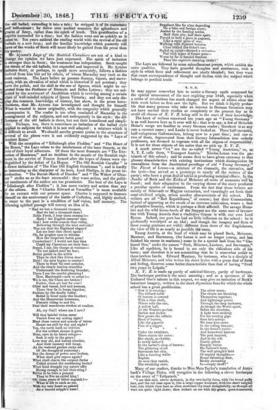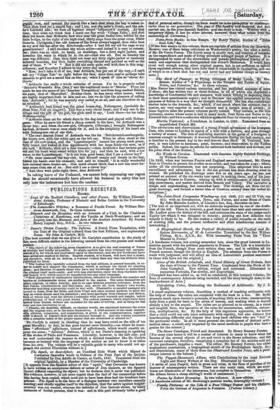E. Y. Z.
IT may appear somewhat late to notice a literary squib composed for the special amusement of the now expiring year 1848, especially when a series of revolutions has much changed the aspect of affairs since the little work before us first saw 'the light. But we think it highly probeble that many persons who take an interest in German literature may
not have carried their studies so completely to the present day as to avoid all chance of X. Y. Z. being still in the start of their knowledge. The knot of writers renowned ten years ago as " Young Germany" is as well known here as it ever will be : that is to say, a few of Heinrich Heine's songs are familiar to every German reader; Gutzkow is at any rate a current name ; and Lanbe is never looked at. These half-sarcastic,, half-voluptuous Gallomaniace, belong now to a past time ; and one or two of them, degenerated from their literary Ishmaelitism into orderly- professors, are doomed to vegetate with all the stigma4of respectability. It is not for these objects of his satire that we pick up X. Y. Z.
A much newer "lot" are the so-called "Young Austrians," or, as X. Y. Z. calls them, "Youngest Austria." Nicolas Lenau was the pa- triarch of this school ; and he seems first to have given currency to that gloomy dissatisfaction with existing institutions which distinguishes its emanations from the Jacobinical persiflage of old " Young Germany." The Faust of Lenau—a mixture of the dramatic, the narrative, and* the lyric—has served as a prototype to nearly all the writers of the party; who have a great deal of talent in producing metrical effects. In the Danko of- Beck and the Ziska of Meissner all sorts of measures will be found ; and their adaptation to the varying theme of the story produced a peculiar species of excitement. From the fact that those writers are mostly of Sclavonie or Magyar extraction, and vauntingly set forth their semi-civilized orif&, arises another ,characteristic of the sohool. The writers are all "Red Republicans," of course ; but their Communism, instead of appearing as the result of an extreme cultivation, wears a face of primitive ferocity, which is perhaps a little affected. The savage Elms- Res and the wild horse-herds of the Steppes are the same sort of favour- ites with Young Austria that a vindictive Giaour is with our own Lord Byron. Indeed, our poet has had no little influence on the school : be is profoundly worshiped as an idol ; and though the imagery and form of these young geniuses are widely different from those of the Englishman, the view of life is as nearly as possible des same.
Young Austria, at the head of which may be placed Beck, Meissner Mautner, and Hartmann, (for-Lenau is now no longer young, and hal finished ids career in madness,) come in for a special lash from the " Un-
famed One," under the names " Mtiusner,Lautner, and Bartinann." Like all squibists, he is bound to see only the ridiculous aide of his butts ; and therefore it is not astonishing that he is somewhat unfair to these lawless bards. Edward' Mantner, for instance, who is a disciple of Alfred Meissner, and 'who writes his short lyrics with a great deal of force and feeling, deserves some better characteristic than that of having "lived two years in Leipzio."
X. Y. Z. is made up partly of satirical history, partly of burlesque. The burlesque portion is the most amusing ; and as a specimen of the IInfamed One's talents in this respect, we may give an imitation of Beck's luxuriant imagery, written in the short rhymelesa lines for which the whole school has a great predilection.
" Now it is evening: The silver moon; The billiard-table The clouds are knocking Of heaven is covered Themselves together; With a blue cloth, And lightnings quiver Where rolls the sun, Through the deep darkness,
A yellow ball, As though the World-spirit,
To the Western pocket. Before his slumbers, Darker and darker A light were striking Now grows the infinite For his evening pipe. Head of heaven, Soon he's asleep: Like the gigantic We hear him snore Pate of a nigger. In the rolling thunder, • in the forests rustle: Under the twinklers, And homeward hastens There stands the moon: The poet inspired, Her cheek, so chubby, And in his soft Is newly-lather'd Elastic pillow In the barber's-shop of heaven; Sleepily buries The glittering cloud His furrow'd brow, Surrounds her chin, The well-plough'd field
Like a dazzling white Of mighty thoughts,—
Napkin. Broad thrashing-floor, At once they vanish, Richly abounding The twinkling stars, In—empty chaff!"
Many of our readers, thanks to Miss Meta Taylor's translation of Auer- baoh's Village Tales, will recognize in the following a clever burlesque on the story of "Tollpatsch." "I see thee still, clever Arthurie, in thy own bodily form, with the broad puffy face, and the red nose upon it, like a large copper kreutzer, with the short tangled hair, into which thou halt so often stretched thy hand thoughtfully, as though all were not quite right there: thou lookeet on me with thy great, good-humoured, Then on . yet s.buido, and the cob- lei's 'L eindel 'WO 'together .stupitfl pitschq' mortals. At that time, thou didst not think that I could one day write ' Village Tales'; and dost thou Yet know, deat'Aitinirle,how-ence near the great linden-tree, behind by the little bridge, to the right of the high-road, thirty steps from the great cross, where Generle, (Iphigenia,) the old hostess-of the Swan always begged, thou didst beat in my new felt bat after the Kirchweik—after I had left my old fur caps to my grandmother? I still recollect thy whole attire—and indeed it is easy to remem- ber: there was no shirt, no boots, no stockings, but a dirty night jacket, and breeches the rents in which let in the air—that was all. But on Sunday the case was different: then thou didst not wear any dirty night jacket or unseemly tattered breeches, but thou hadst everything darned and patched as well as the west of them. • * • • But it did not seem quite well with thee in this mag- nificence; and therefore I adhere to thy every-day attire.
"Now, don't take it ill of dear Arthurle, but get out of the way,—I can't tell my Village Tale! so right before thy face; since thou may'st perhaps take occasion to give me a sound boa on-the ear, 'when I speak of thee as clever Ar- thurle.'
"Arthurle has really a whole calendar of names. For he is properly called Selcher's Wurstel's Buts, (boy,)' and his baptismal name is Seneca.' From his uncle he has the name-of the 'knacker Theophilnsl,' and from long-necked Bibele, his aunt, that of `Maccelleri.' Besides these, he has many other names, which are highly iniportaut&hoth, to him and us; but we do him the pleasure of calling him 'Arthurle'; for, beweaticarcely ever called so at all, and can therefore do us
no mischief. * * • , • .
" Artharle's 4stfriend was the gra4.-,h4e4s-dog, Noltangerer, (probably de- rived from Noli rhi:tangere). This was a very clever beast; and if any one in the village had thigift; of the gab, the girls to say, ' Look there—he too talks Noltarigerish/y.""3 "Arthurle often sat for Whole days in the dog-kennel and played with Noltan- gerer. Often he gave-his friend-a sharp scratch in the face; for Arthurle was a clever boy; and- when the-cow-girl, Ohmperle, (Olympia,) brought Noltangerer his food, Arthurle widest once ready-for it, and in the simplicity of his heart ate with NoltangerecOnt of one dish.
" The next friend of Arthurle was the fat Reitzkrentzlauenburgerin, the brown cow, w the white vet on the left ear. When he often stood at the door of the cow- and the Lauenburgerin' turned her plump neck grace- fully round, and it him significantly with her large finely-cut eyes, as if
she said Arthurle, ,Ott' art a dear treasure,'—then Arthurles face became quite red and his hestitmiteierannd within him for joy • and then he said, with a low voice, to the Lauenbtirgen, ' Is it not true, good beast, that I am a clever boy?' - " He then mounted the hay-rick, laid himself snugly and deeply in the hay, folded his hands over hiLatomach, and said to himself, It is really wonderful haw rational these brutes are. One could almost think that a cow has more ha- *weans° than one of us. But still I am a clever boy.' • And thou wert quite right there, dear Arthurle I" In taking leave of the Unfamed, we cannot help expressing our regret tlltat -he should occasionally have allowed his humour to carry him not Oily into the indecorous but into the unclean.



























 Previous page
Previous page